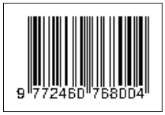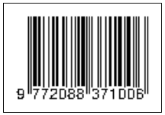Pengenalan Karakter Tulisan Tangan Dengan K-Support Vector Nearest Neighbor
Aditya Surya Wijaya(1), Nurul Chamidah(2*), Mayanda Mega Santoni(3)
(1) Fakultas Ilmu Komputer, Universitas Pembangunan Nasional Veteran Jakarta
(2) Fakultas Ilmu Komputer, Universitas Pembangunan Nasional Veteran Jakarta
(3) Fakultas Ilmu Komputer, Universitas Pembangunan Nasional Veteran Jakarta
(*) Corresponding Author
Abstract
Handwritten characters are difficult to be recognized by machine because people had various own writing style. This research recognizes handwritten character pattern of numbers and alphabet using K-Nearest Neighbour (KNN) algorithm. Handwritten recognition process is worked by preprocessing handwritten image, segmentation to obtain separate single characters, feature extraction, and classification. Features extraction is done by utilizing Zone method that will be used for classification by splitting this features data to training data and testing data. Training data from extracted features reduced by K-Support Vector Nearest Neighbor (K-SVNN) and for recognizing handwritten pattern from testing data, we used K-Nearest Neighbor (KNN). Testing result shows that reducing training data using K-SVNN able to improve handwritten character recognition accuracy.
Keywords
Full Text:
PDFReferences
[1] N. Islam, Z. Islam, and N. Noor, “A Survey on Optical Character Recognition System,” J. Inf. Commun. Technol., vol. 10, no. 2, pp. 1–4, 2016.
[2] N. Ilmi, W. T. A. Budi, and R. K. Nur, “Handwriting digit recognition using local binary pattern variance and K-Nearest Neighbor classification,” in 2016 4th International Conference on Information and Communication Technology (ICoICT), 2016, pp. 1–5.
[3] F. Kimura and M. Shridhar, “Handwritten numerical recognition based on multiple algorithms,” Pattern Recognit., vol. 24, no. 10, pp. 969–983, Jan. 1991.
[4] L. M. Lorigo and V. Govindaraju, “Offline Arabic handwriting recognition: a survey,” IEEE Trans. Pattern Anal. Mach. Intell., vol. 28, no. 5, pp. 712–724, May 2006.
[5] N. Mehta and J. Doshi, “A Review of Handwritten Character Recognition,” Int. J. Comput. Appl., vol. 165, no. 4, pp. 37–40, May 2017.
[6] S. IMPEDOVO, L. OTTAVIANO, and S. OCCHINEGRO, “OPTICAL CHARACTER RECOGNITION — A SURVEY,” Int. J. Pattern Recognit. Artif. Intell., vol. 05, no. 01n02, pp. 1–24, Jun. 1991.
[7] Min-Ling Zhang and Zhi-Hua Zhou, “A k-nearest neighbor based algorithm for multi-label classification,” in 2005 IEEE International Conference on Granular Computing, 2005, p. 718–721 Vol. 2.
[8] M. Kibanov, M. Becker, J. Mueller, M. Atzmueller, A. Hotho, and G. Stumme, “Adaptive kNN using expected accuracy for classification of geo-spatial data,” in Proceedings of the 33rd Annual ACM Symposium on Applied Computing - SAC ’18, 2018, pp. 857–865.
[9] E. Purwandari, D. Puspitaningrum, and A. Mirfen, "Identifikasi Tanda Tangan Dengan Pendekatan Support Vector Machine," Jurnal Sains, Teknologi dan Industri, vol. 12, no 2, 2015.
[10] M. S. Kadhm and A. P. D. A. K. Abdul, “Handwriting Word Recognition Based on SVM Classifier,” Int. J. Adv. Comput. Sci. Appl., vol. 6, no. 11, 2015.
[11] R. A. Misnadin, S. A. S. Mola, and A. Fanggidae, “Pengenalan Pola Tulisan Tangan Dengan Metode K – Nearest Neighbor,” J. Komput. dan Inform., vol. 2, no. 1, pp. 65–72, Nov. 2016.
[12] E. Prasetyo, K-Support Vector Nearest Neighbor Untuk Klasifikasi Berbasis K-NN. 2012.
[13] S. G. Wu, F. S. Bao, E. Y. Xu, Y.-X. Wang, Y.-F. Chang, and Q.-L. Xiang, “A Leaf Recognition Algorithm for Plant Classification Using Probabilistic Neural Network,” Jul. 2007.
[14] N. P. Sutramiani, Ik. G. Darmaputra, and M. Sudarma, “Local Adaptive Thresholding Pada Preprocessing Citra Lontar Aksara Bali,” Maj. Ilm. Teknol. Elektro, vol. 14, no. 1, Jun. 2015.
[15] R. C. Gonzalez and R. E. (Richard E. Woods, Digital image processing. Prentice Hall, 2008.
[16] B. Jähne, Digital Image Processing. Berlin, Heidelberg: Springer Berlin Heidelberg, 2002.
[17] Y. Deng, B. S. Manjunath, and H. Shin, “Color Image Segmentation N,” Comput. Eng., vol. 18, no. 10, pp. 2330–9, 2009.
[18] D. Putra, Pengolahan Citra Digital. Penerbit Andi.
[19] S. V Rajashekararadhya, “Efficient Zone Based Feature Extration Algorithm for Handwritten Numeral Recognition of Four Popular South Indian Scripts,” J. Theor. Appl. Inf. Technol., vol. 4, no. 12, pp. 1171–1181, 2008.
[20] Y. Kumar Jain and S. Kumar Bhandare, “Min Max Normalization Based Data Perturbation Method for Privacy Protection,” Int. J. Comput. Commun. Technol., 2011.
[21] L. Al Shalabi, Z. Shaaban, and B. Kasasbeh, “Data Mining: A Preprocessing Engine,” J. Comput. Sci., vol. 2, no. 9, pp. 735–739, Sep. 2006.
[22] R. Kohavi, “A Study of Cross-Validation and Bootstrap for Accuracy Estimation and Model Selection,” Appear. Int. Jt. Conf. Articial Intell., vol. 5, pp. 1–7, 1995.
Article Metrics
Refbacks
- There are currently no refbacks.
Copyright (c) 2019 IJEIS (Indonesian Journal of Electronics and Instrumentation Systems)

This work is licensed under a Creative Commons Attribution-ShareAlike 4.0 International License.
View My Stats1








